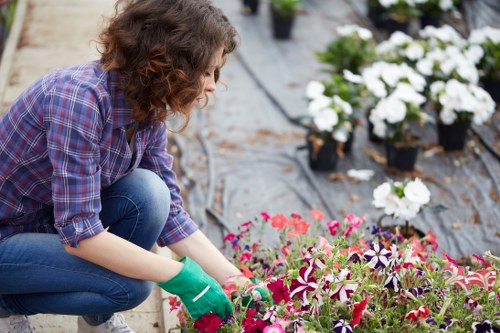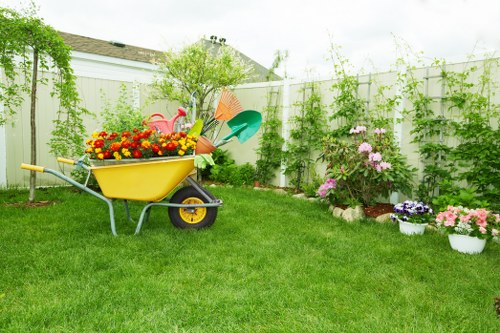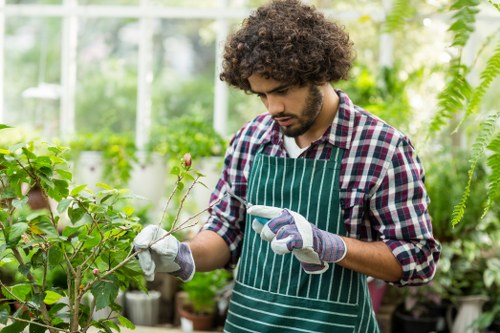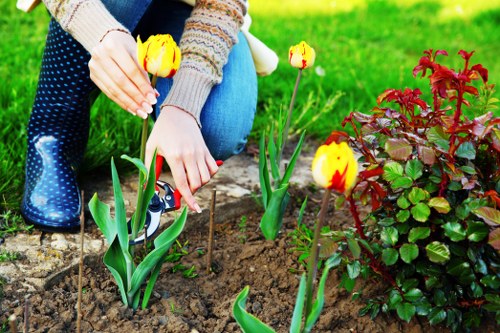Garden Maintenance in Hoxton: Keeping Your Green Space Pristine
Introduction to Garden Maintenance

Maintaining a beautiful garden in Hoxton requires consistent care and attention. Whether you have a small urban garden or a spacious backyard, regular maintenance ensures that your plants thrive and your outdoor space remains inviting.
Garden maintenance involves a variety of tasks, from watering and weeding to pruning and fertilizing. Each activity plays a crucial role in the overall health and appearance of your garden.
In this article, we'll explore essential garden maintenance practices tailored specifically for the Hoxton area, considering its unique climate and urban environment.
Lawn Care Basics

A well-maintained lawn is the foundation of any beautiful garden. In Hoxton, where the climate can be unpredictable, proper lawn care is essential to keep your grass healthy and lush.
Regular Mowing: Mow your lawn regularly to encourage even growth and prevent weeds from taking hold. Aim for a height of about 2.5 inches, which is ideal for most grass types.
Watering: Ensure your lawn receives adequate water, especially during dry spells. Early morning watering is best to reduce evaporation and fungal growth.
Pruning and Trimming

Pruning is vital for the health and aesthetics of your garden plants. Proper trimming promotes growth, removes dead or diseased branches, and maintains the desired shape of your plants.
When to Prune: The best time to prune most plants is during the late winter or early spring before new growth begins. However, some flowering plants may require pruning after they bloom.
Tools and Techniques: Use clean, sharp tools to make precise cuts. Avoid over-pruning, which can stress plants and reduce their vigor.
Weed Control Strategies

Weeds compete with your garden plants for nutrients, water, and sunlight. Effective weed control is essential to maintain a healthy and beautiful garden.
- Manual Removal: Regularly inspect your garden and remove weeds by hand or with weeding tools. This method is labor-intensive but effective.
- Mulching: Apply mulch around your plants to suppress weed growth, retain soil moisture, and regulate soil temperature.
- Herbicides: Use chemical or organic herbicides as a last resort. Always follow the manufacturer's instructions to avoid harming desirable plants.
Soil Health and Fertilization

Healthy soil is the foundation of a thriving garden. Proper soil maintenance ensures that your plants receive the necessary nutrients for growth.
Soil Testing: Conduct regular soil tests to determine its pH and nutrient levels. This information helps you choose the right fertilizers and amendments.
Composting: Add organic matter to your soil through composting. Compost improves soil structure, enhances fertility, and promotes beneficial microbial activity.
Seasonal Maintenance Tips

Spring Gardening
Spring is the perfect time to prepare your garden for the growing season. Start by clearing away winter debris, planting new bulbs, and applying a balanced fertilizer to give your plants a nutrient boost.
Summer Care
During the summer months, focus on watering, weeding, and monitoring for pests. Regularly mulch your garden beds to retain moisture and keep weeds at bay.
Autumn Preparations
As temperatures drop, prepare your garden for winter by pruning dead branches, planting cover crops, and protecting sensitive plants from frost.
Pest and Disease Management

Pests and diseases can severely impact the health of your garden. Implementing effective management strategies is crucial to prevent and control infestations.
- Identification: Accurately identify the pests or diseases affecting your plants to determine the appropriate treatment.
- Natural Remedies: Use organic treatments like neem oil, insecticidal soaps, or beneficial insects to manage pests without harmful chemicals.
- Preventive Measures: Maintain good garden hygiene, rotate crops, and choose disease-resistant plant varieties to minimize the risk of outbreaks.
Irrigation Systems

Efficient watering is essential for garden health, especially in an urban setting like Hoxton where water conservation may be a priority.
Drip Irrigation: Drip systems deliver water directly to the base of plants, reducing evaporation and ensuring deep soil penetration.
Rain Barrels: Collecting rainwater helps reduce your reliance on municipal water and provides a sustainable water source for your garden.
Hardscaping and Garden Design

Integrating hardscaping elements like pathways, patios, and garden structures enhances the functionality and aesthetic appeal of your garden.
Pathways: Create clear walkways to navigate your garden easily while protecting plants from foot traffic damage.
Seating Areas: Incorporate benches or outdoor furniture to create inviting spaces for relaxation and socializing.
Choosing the Right Plants

Selecting plants that are well-suited to Hoxton's climate and soil conditions is vital for a successful garden.
- Native Plants: Opt for native species that are adapted to the local environment and require less maintenance.
- Perennials vs. Annuals: Combine perennials, which return year after year, with annuals for seasonal color and variety.
- Drought-Tolerant Varieties: Incorporate plants that can withstand dry periods, reducing the need for frequent watering.
Garden Tools and Equipment

Having the right tools is essential for efficient garden maintenance. Invest in quality equipment to make your gardening tasks easier and more effective.
Basic Tools: Essential tools include a sturdy shovel, pruning shears, a garden fork, and a reliable hose with adjustable nozzles.
Advanced Equipment: Consider using a lawnmower, leaf blower, or electric trimmers to handle larger maintenance tasks with ease.
Eco-Friendly Gardening Practices

Adopting sustainable gardening practices not only benefits the environment but also creates a healthier garden ecosystem.
Composting: Reduce waste by composting kitchen scraps and garden clippings, which enrich the soil and promote microbial health.
Organic Fertilizers: Use natural fertilizers to nourish your plants without introducing harmful chemicals into the environment.
Dealing with Seasonal Pests

Seasonal changes can bring different pests that threaten your garden. Being proactive in pest management helps maintain plant health throughout the year.
- Spring Pests: Watch for aphids and caterpillars that emerge as plants begin to grow.
- Summer Pests: Keep an eye out for beetles, mites, and slugs that thrive in warmer temperatures.
- Autumn Pests: Prepare for rodent activity and fungal diseases as the weather cools.
Winter Garden Care

Proper winter care ensures that your garden survives the colder months and emerges healthy in the spring.
Protecting Plants: Use mulch or frost blankets to shield sensitive plants from freezing temperatures and harsh winds.
Tool Maintenance: Clean and store your garden tools properly to prevent rust and damage during the off-season.
Benefits of Professional Garden Maintenance

While DIY garden maintenance is rewarding, hiring professional services can provide expertise and save you time.
Expert Knowledge: Professional gardeners have the skills and experience to address complex garden issues effectively.
Time-Saving: Outsourcing maintenance tasks allows you to enjoy your garden without the hassle of constant upkeep.
Contact us today to learn more about our professional garden maintenance services in Hoxton.Organic Gardening Techniques

Adopting organic gardening practices promotes a healthy ecosystem and reduces reliance on synthetic chemicals.
Natural Pest Control: Encourage beneficial insects like ladybugs and praying mantises to keep pest populations in check.
Organic Fertilizers: Use compost, manure, and other organic materials to enrich the soil naturally.
Scheduling Your Maintenance Routine

Establishing a regular maintenance schedule ensures that all aspects of your garden receive appropriate attention.
- Daily: Quick inspections for pests and general plant health.
- Weekly: Mowing, weeding, and watering as needed.
- Monthly: Deep soil amendments, pruning, and larger maintenance tasks.
Book your service now to stay on track with your garden maintenance schedule.
Creating a Sustainable Garden

Sustainability in gardening minimizes environmental impact while maximizing resource efficiency.
Rainwater Harvesting: Install rain barrels to collect and use rainwater for irrigation, reducing water waste.
Native Plant Landscaping: Choose plants that are native to Hoxton to ensure they are well-adapted and require less maintenance.
Lighting and Decor

Enhancing your garden with lighting and decorative elements creates a welcoming and functional outdoor space.
Outdoor Lighting: Use solar-powered or LED lights to illuminate pathways and highlight garden features sustainably.
Decorative Features: Incorporate elements like garden statues, water features, or decorative pots to add personality and charm.
Winterizing Your Garden

Preparing your garden for winter helps protect your plants and ensures a smooth transition into the next growing season.
Covering Plants: Use burlap or frost cloths to cover delicate plants and prevent frost damage.
Storage: Store garden furniture, tools, and equipment in a dry place to prolong their lifespan.
Conclusion

Effective garden maintenance in Hoxton involves a combination of regular care, proper planning, and sustainable practices. By following the tips outlined in this article, you can enjoy a vibrant and healthy garden all year round.
Whether you choose to maintain your garden yourself or hire professional services, investing time and effort into garden upkeep pays dividends in beauty and tranquility.
Ready to transform your garden? Contact us today to discover how our expert garden maintenance services can help you achieve the garden of your dreams in Hoxton.